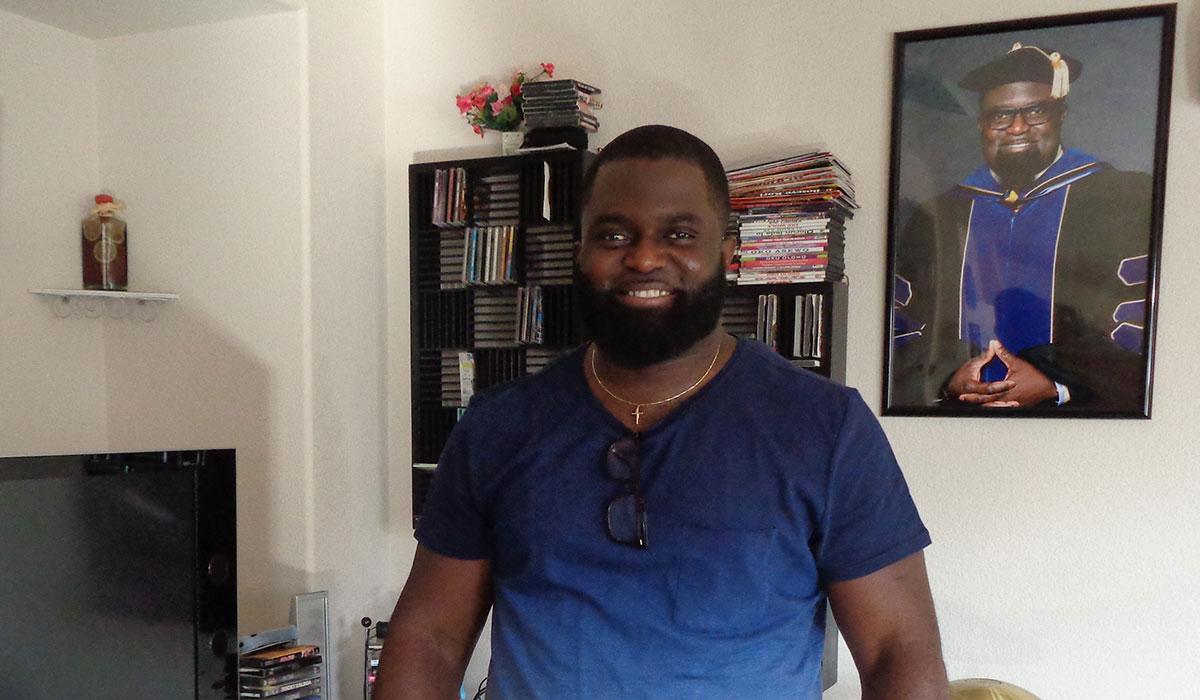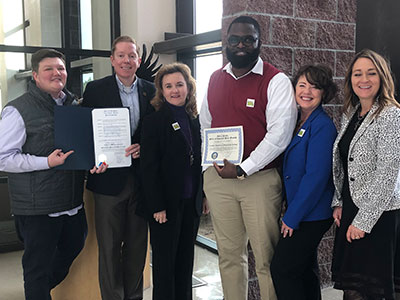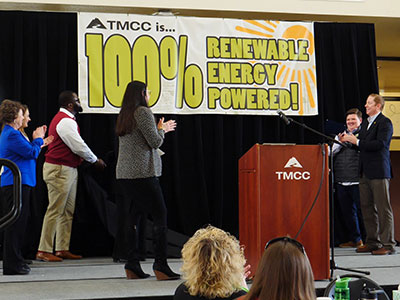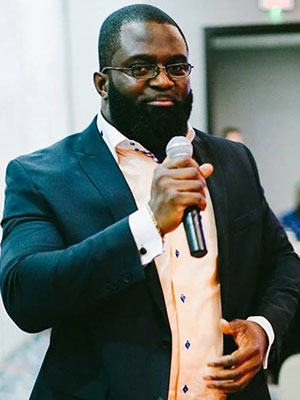
As TMCC begins the process of re-opening, many students, faculty, and staff will drive on the roads surrounding the Dandini Campus, pass the soccer field or quad and park in one of the many newly resurfaced parking lots. These are the details of our days that oftentimes go unnoticed, and yet, for Assistant Director of Facilities Operations and Capital Planning, Dr. Ayodele Akinola, these surfaces represent one of the most challenging and rewarding projects he has worked on to date at TMCC, the Dandini Roadway Rehabilitation Project.
“Every project is always limited in budget and site conditions will always change, especially considering the live loading effects of heavy pieces of construction equipment, and the highly plastic fat clay we sit on at the Dandini Campus.” he said. However, for the Dandini Roadway Rehabilitation Project, after deploying a drone flight to delineate close contour lines for drainage and conducting a geotechnical investigation that involved evaluating the physical properties of the soil, Akinola delivered a workable solution within the existing budget constraints for a roadway that offers unimpeded campus access today.
“The most rewarding thing about the Dandini Roadway Rehabilitation Project was that I made sure that every dollar was stretched as far as possible, which is actually shown by the marginal utility derived from improved safety and ride-ability of the roadway surfaces,” Akinola said.
Stewardship of Plants and Facilities
TMCC’s Facilities Operations and Capital Planning department is a hard-working department that manages the physical infrastructure of TMCC at all locations—everything from maintenance, HVAC, custodial, equipment, design/construction to TMCC’s grounds (the lawn, rose bushes, trees, shrubbery, and even the soccer field), the HVAC systems, airflow through the building, plumbing, parking, snow removal, pest control...the list is long and the work, continuous.
As a young person with strong science and math skills, Akinola was always interested in understanding how things are put together, and how they function as a whole. While in college in the 1990s during the advent of computers and electronics/automation engineering, the evolution and the advancement of technology spurred his interest to obtaining a degree in Electrical and Electronics Engineering. “Programmable logic controlling and automation sounded so interesting,” he said.
Today, Akinola holds a doctoral degree in business administration with a specialty in Project Management, a gamut of certifications, and a Lean-Six Sigma expert at the Black Belt level, a globally-recognized credential that provides additional leadership skills to lead project teams and manage process improvement initiatives by reducing variation and removing waste.
A lifelong learner, Akinola is on the constant search for knowledge and professional development. Prior to coming to TMCC, he worked for the Nevada Department of Transportation for nearly 14 years, where he was exposed to civil engineering concepts as they relate to roadways, structures, materials, inspection, and transportation engineering. Instead of seeing this new information as a “challenge,” though, Akinola saw it as a motivator that inspired him to set new goals, improve his professional performance in order to achieve a higher level of excellence in his field.
“Challenges energize me in demonstrating the desire for persistence of effort to achieve success on difficult tasks. Challenges channel my direction to the detection of strategies for effective execution of delegated tasks,” he said. Instead, Akinola saw this as an opportunity to continue to learn and develop himself professionally. “I wouldn’t say that I’m idle, but I believe that an idle mind is the devil’s workshop, so I always try to stay busy... so, I’ll just pick up a degree or a certification in whatever sounds interesting. I’m a person who is curious, and works to accrue knowledge.”
At TMCC, Akinola is a part of a team that creates a positive experience for students, staff, and faculty through a beautiful and well-maintained campus environment at all TMCC locations. “And at facilities, this is delivered and shown through the high-quality state of our infrastructure and operations, programs, customer service delivery, customer service management, and the development of policies and procedures that align with the mission of TMCC,” he said. “At Facilities Operations & Capital Planning department, we pride ourselves in the height of excellent and prompt customer service delivery.”
Contributing to the Understanding of Infrastructure

Dr. Akinola has been an integral part of TMCC ability to achieve the major milestone of utilizing 100% renewable energy.”
Akinola came to TMCC about twenty months ago because the position offered him an opportunity to put his diverse professional and academic background to use. “TMCC provided the perfect opportunity in the position, considering my background experience in electrical/electronics engineering, civil engineering, structural engineering, materials engineering, inspection engineering, construction engineering, project management, operations management, business administration, and lean/six sigma at a black belt level. If you think about it, this is what makes up Facilities Operation and Capital Planning,” he said.
TMCC provided Akinola an opportunity to put his diversified professional background and terminal degree to use, especially in regards to taking needed areas of research as knowledge gaps from the industry to the academic environment to further contribute to the body of professional knowledge. He provides this example: in the path to eliminate greenhouse gas emissions from hydrochlorofluorocarbons (HCFC) and hydrofluorocarbons (HFC) refrigerants, a knowledge gap still exists in discovering the perfect refrigerant that replaces HCFCs and HFCs, yet energy efficient and without greenhouse gas emissions.
When murmurs of the Parr Bridge repair project surfaced in 2019, Akinola participated in stakeholder meetings with NDOT, where he and others from TMCC Facilities Operations and Capital Planning department offered recommendations for the project which began on June 12 of this year. Akinola recommended the use of decked bulb tee girders instead of I-girders on the project to accelerate the construction project. His insights came from his previously published research paper on examining the cost distinction between the accelerated bridge construction and the conventional cast-in place methods of bridge construction.
In addition to his responsibilities at TMCC, Akinola volunteers on four boards during his free time, two of which are local and two, national. He is the membership chairperson of the Northern Nevada Facilities Management Association (NNFMA), the Board President of Stonefield Homeowners Association, the Chairperson of Information & Communications committee for the Pacific Coast Association of Physical Plant Administrators (PCAPPA) and a member of the of Information & Communications committee at the national level of the Association of Physical Plant Administrators, APPA.
“My participation is solely about bringing measurable and positive change to my home community and professional community, which is about the provision of positive returns back to TMCC,” said Akinola. “As an example, APPA comprises professionals from more than 18,000 educational facilities from over 1,300 learning institutions worldwide. In APPA, we guarantee availability of best practices through diversified experiences and situations, thus contributing to the body of Physical Plant professional knowledge.”
This shared knowledge across several professionals and institutions is especially important given the challenges offered by COVID-19. “What do we do to guarantee the safe return of staff and faculty back to campus? It’s leveraging contact, leveraging knowledge, leveraging best practices from such membership,” he said.
Akinola has been working on designing and activating a detailed business continuity plan, pre- and post-COVID-19 shutdown, that includes campus-wide disinfection, enhanced cleaning in office areas, common areas, and high traffic areas.Akinola is also involved in planning staff member lines of succession in case of illness, cross training for critical task deployment, and discouraging social density during on-going campus operations.
“To get a little more granular, from a custodial standpoint, we are at the front lines of emergency response preparedness. From a maintenance standpoint, we improve floorplans, reconfigure furniture layout, install Plexiglass shields at areas of high customer interface, install floor markers to comply with CDC social distancing guidelines. And from an HVAC standpoint, we implement filter changes and increase outdoor air ventilation supply by adjusting the recirculation dampers for more outside air feed. All the while, of course, coordinating action plans to deliver a department-wide safety protocol,” he said.
Despite the busy-ness, though, Akinola makes a point to take time to recognize the hard work of his team. “I try to give my employees a daily repeated ‘you’re doing great!’ I don’t want to slack in my responsibilities of how I validate my staff members,” he said.
Making Campus a Welcome Space for Learning and Growth
Every year, Akinola serves on TMCC’s Commencement Committee, offering insight to safety, set-up, layout for access, including ingress and egress for students, faculty, and staff. “As a member of the commencement committee, I contribute to streamlining the planning of this benchmark moment, where our students deserve the royal treatment, and we are prepared to do everything for their success,” he said.
Akinola is also a member of the Faculty of Color Coalition, a deliberative assembly of TMCC staff members and faculty members who self-identify as faculty of color or allies of FOC. “At FOC, I contribute to fostering a sense of community through various discussions for learning, sharing of ideas, and creating a feeling of connection for relatability, student support, retention, and student success. It’s easy when you see someone who is in the role that you aspire to be, or someone you have something in common with.”
Akinola cited the Spartan Pledge event which took place in Fall 2019 as an example of the collective and communal support offered by the Faculty of Color Coalition. The event invited participants to take a pledge to support veterans and those impacted by veteran suicide. “You really don’t know what veterans go through until you go to an event like that,” he said. “The connection is deep, and this is one of the things that the FOC tries to reinforce, helping students, helping veterans, and members of the community alike. Literally, just trying to make the community more supportive to our veterans.”
In addition to contributing to the campus community as a positive role model, Akinola has also been involved with several sustainability initiatives, such as the Green Rider program, which enabled TMCC to achieve sustainability goals by offsetting 100% of our load service with renewable energy resources from NV Energy.

Dr. Akinola has been involved in several sustainability initiatives, such as the Green Rider Program.
This, like many of Akinola’s projects, involved a lot more than meets the eye. “This GreenRider process involved calculating the total electrical energy consumption across all TMCC sites in kilowatt-hour, and offsetting with all generations from our renewable sources, considering and calculating anticipated consumption for ongoing and future projects to keep us 100% green. I was also involved with rate discussions, contracting and hearings at the State of Nevada Public Utilities Commission,” he said.
Akinola is working on future green initiatives, including a green pest control initiative that employs an integrated pest management method that uses natural resources to control pests, which will mitigate the domino-effect of killing an entire food chain. For example: imagine feeding poison to a mouse, cat eats mouse, raccoon eats cat, and mountain lion eats raccoon, consequently killing an entire food chain, negatively impacting a balanced ecosystem surrounding TMCC locations. Green pest control preserves wildlife, habitats, and creatures that surround our campus spaces.
The Importance of Place

In addition to his many duties as Assistant Director in Facilities, Operations Management and Capital Planning, he also serves several leadership roles in the local and national community.
Akinola approaches his work and life through the lens of his religious faith, which has instilled a rigorous work ethic, kindness, and care into his daily life. He serves as a Deacon at a local church where he’s led Bible studies and also the church choir. These beliefs and roles shape his professional life and his philosophy regarding the sanctity of life, and the power of prayer to bring positive change to the community around us.
“As a Christian, I believe that those who fight on their knees have victory in the spirit. Spirituality is best understood by acknowledging the authenticity of life’s invisible forces, such as the influences of the power of love over people through the unseen bonds of family and friendship, which can be transferred to nationality and race issues. Since our lives are governed by these invisible influences, we can all shape our physical environment, actions, and activities by power of love, directing our mind to better action. Praying for love influences the fight for the battle of racial injustice on our knees to receive victory in the spirit, [and] an eventual physical manifestation,” he said.
For a professional who maintains a college campus and strives to provide safe physical spaces where students, faculty, staff, and visitors can experience learning, growth, understanding, and community, Akinola is answering—and continues to answer—a high and necessary calling.
For more information about Facilities Operations and Capital Planning at TMCC, contact the department at 775-673-7100.






